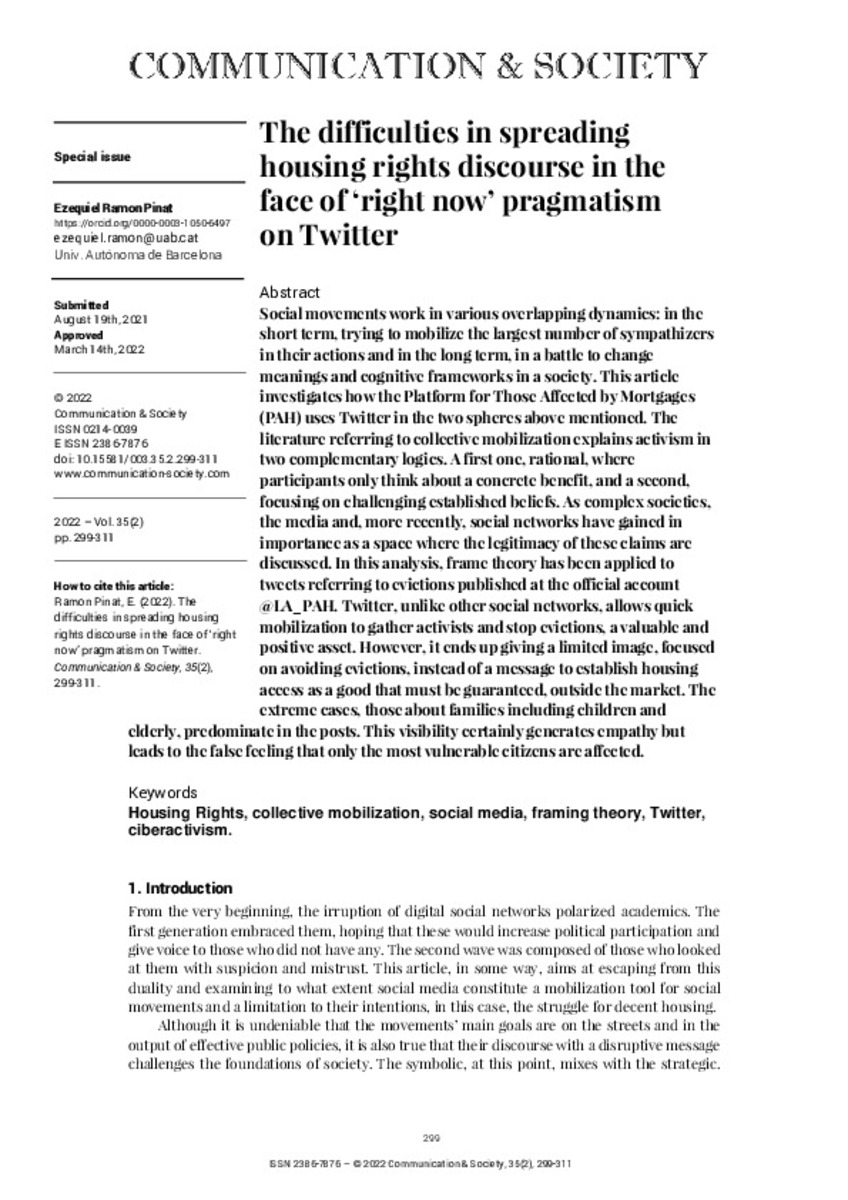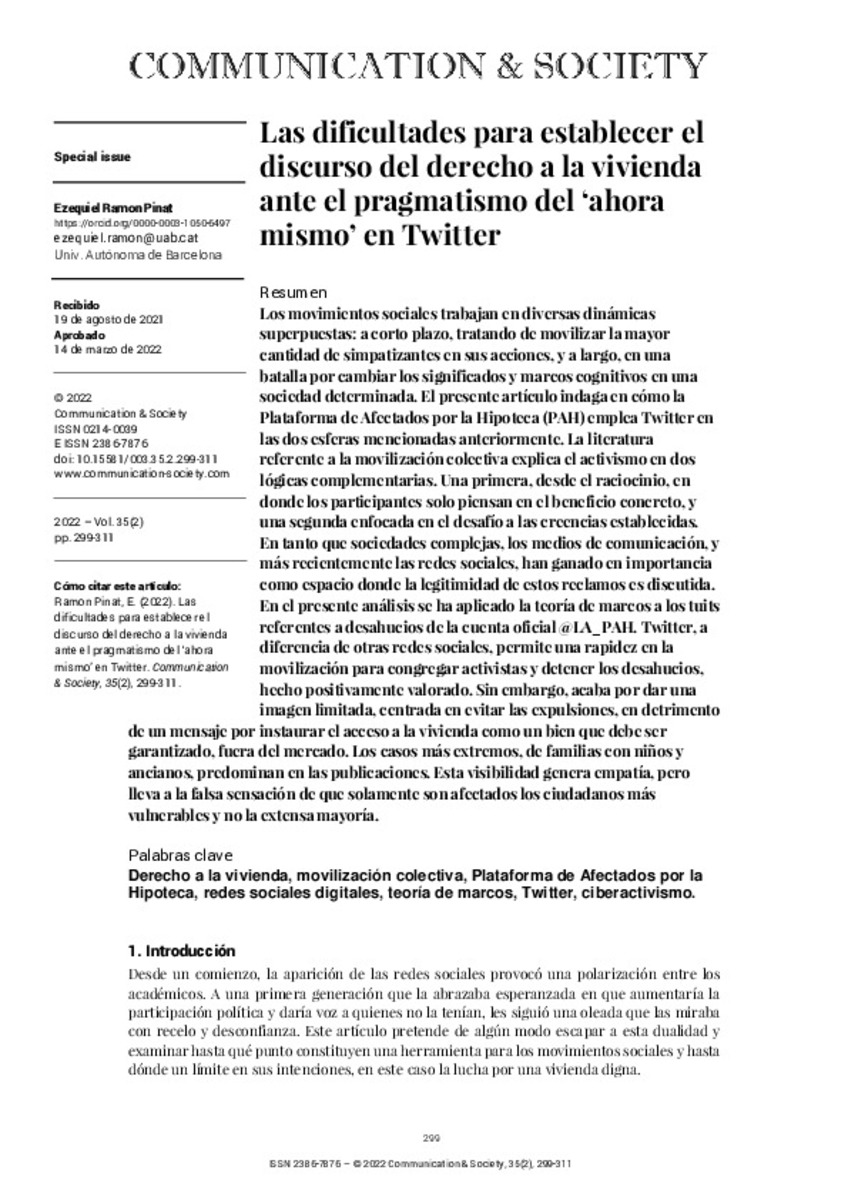Full metadata record
| DC Field | Value | Language |
|---|---|---|
| dc.creator | Ramon-Pinat, E. (Ezequiel) | - |
| dc.date.accessioned | 2022-04-01 | - |
| dc.date.accessioned | 2022-05-19T06:19:58Z | - |
| dc.date.available | 2022-05-19T06:19:58Z | - |
| dc.date.issued | 2022 | - |
| dc.identifier.citation | Ramon-Pinat, E. (Ezequiel). "The difficulties in spreading housing rights discourse in the face of ‘right now’ pragmatism on Twitter". Communication & Society. 35 (2), 2022, 299 - 311 | es |
| dc.identifier.issn | 2386-7876 | - |
| dc.identifier.uri | https://hdl.handle.net/10171/63463 | - |
| dc.description.abstract | Social movements work in various overlapping dynamics: in the short term, trying to mobilize the largest number of sympathizers in their actions and in the long term, in a battle to change meanings and cognitive frameworks in a society. This article investigates how the Platform for Those Affected by Mortgages (PAH) uses Twitter in the two spheres above mentioned. The literature referring to collective mobilization explains activism in two complementary logics. A first one, rational, where participants only think about a concrete benefit, and a second, focusing on challenging established beliefs. As complex societies, the media and, more recently, social networks have gained in importance as a space where the legitimacy of these claims are discussed. In this analysis, frame theory has been applied to tweets referring to evictions published at the official account @LA_PAH. Twitter, unlike other social networks, allows quick mobilization to gather activists and stop evictions, a valuable and positive asset. However, it ends up giving a limited image, focused on avoiding evictions, instead of a message to establish housing access as a good that must be guaranteed, outside the market. The extreme cases, those about families including children and elderly, predominate in the posts. This visibility certainly generates empathy but leads to the false feeling that only the most vulnerable citizens are affected. | en_US |
| dc.description.abstract | Los movimientos sociales trabajan en diversas dinámicas superpuestas: a corto plazo, tratando de movilizar la mayor cantidad de simpatizantes en sus acciones, y a largo, en una batalla por cambiar los significados y marcos cognitivos en una sociedad determinada. El presente artículo indaga en cómo la Plataforma de Afectados por la Hipoteca (PAH) emplea Twitter en las dos esferas mencionadas anteriormente. La literatura referente a la movilización colectiva explica el activismo en dos lógicas complementarias. Una primera, desde el raciocinio, en donde los participantes solo piensan en el beneficio concreto, y una segunda enfocada en el desafío a las creencias establecidas. En tanto que sociedades complejas, los medios de comunicación, y más recientemente las redes sociales, han ganado en importancia como espacio donde la legitimidad de estos reclamos es discutida. En el presente análisis se ha aplicado la teoría de marcos a los tuits referentes a desahucios de la cuenta oficial @LA_PAH. Twitter, a diferencia de otras redes sociales, permite una rapidez en la movilización para congregar activistas y detener los desahucios, hecho positivamente valorado. Sin embargo, acaba por dar una imagen limitada, centrada en evitar las expulsiones, en detrimento de un mensaje por instaurar el acceso a la vivienda como un bien que debe ser garantizado, fuera del mercado. Los casos más extremos, de familias con niños y ancianos, predominan en las publicaciones. Esta visibilidad genera empatía, pero lleva a la falsa sensación de que solamente son afectados los ciudadanos más vulnerables y no la extensa mayoría. | es_ES |
| dc.language.iso | eng | - |
| dc.publisher | Servicio de Publicaciones de la Universidad de Navarra | es_ES |
| dc.rights | info:eu-repo/semantics/openAccess | es_ES |
| dc.subject | Derecho a la vivienda | - |
| dc.subject | movilización colectiva | - |
| dc.subject | Plataforma de Afectados por la Hipoteca | - |
| dc.subject | redes sociales digitales | - |
| dc.subject | teoría de marcos | - |
| dc.subject | - | |
| dc.subject | ciberactivismo | - |
| dc.title | The difficulties in spreading housing rights discourse in the face of ‘right now’ pragmatism on Twitter | en_US |
| dc.type | info:eu-repo/semantics/article | es_ES |
| dc.identifier.doi | 10.15581/003.35.2.299-311 | - |
| dadun.citation.endingPage | 311 | - |
| dadun.citation.number | 2 | - |
| dadun.citation.publicationName | Communication & Society | - |
| dadun.citation.startingPage | 299 | - |
| dadun.citation.volume | 35 | - |
Statistics and impact
Items in Dadun are protected by copyright, with all rights reserved, unless otherwise indicated.







